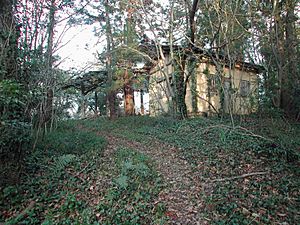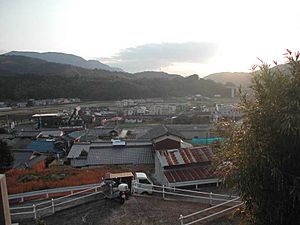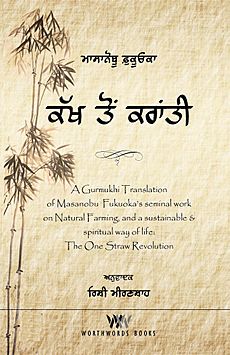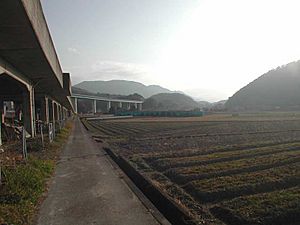Masanobu Fukuoka facts for kids
Quick facts for kids
Masanobu Fukuoka
|
|
|---|---|
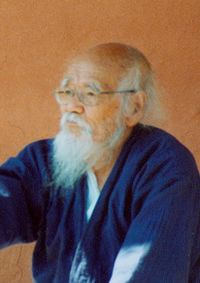
Masanobu Fukuoka, in 2002.
|
|
| Born | 2 February 1913 Iyo, Japan
|
| Died | 16 August 2008 (aged 95) Iyo, Japan
|
| Nationality | Japanese |
| Occupation | Agricultural scientist, farmer, author |
| Known for | Philosophy, natural farming |
|
Notable work
|
The One-Straw Revolution |
| Awards | Ramon Magsaysay Award, Desikottam Award, Earth Council Award |
Masanobu Fukuoka (Japanese: 福岡 正信, Hepburn: Fukuoka Masanobu, 2 February 1913 – 16 August 2008) was a Japanese farmer and thinker. He became famous for his ideas on "natural farming." This special way of farming helps land that has become like a desert grow plants again.
Fukuoka believed in farming without tilling (turning over) the soil. He also avoided using harmful chemicals like herbicides and pesticides. His unique method is often called "do-nothing farming."
He wrote many books and appeared in TV shows. His ideas inspired people interested in natural food and living. He always spoke about the importance of following nature's rules.
Contents
Masanobu Fukuoka's Life Story
Masanobu Fukuoka was born on February 2, 1913, in Iyo, Japan. His family owned a lot of land. He studied to become a microbiologist and agricultural scientist. He worked as an inspector for plants at the Yokohama Customs Bureau.
In 1937, he got very sick. While he was getting better, he had a big spiritual experience. This changed how he saw the world. He started to question modern farming methods. He then quit his job and went back to his family's farm in southern Japan.
From 1938, Fukuoka began trying new farming ideas. He experimented with organic citrus trees. He stopped pruning some trees, which made them grow wild. This experience taught him a lot about how nature works. His experiments were paused during World War II. He worked on food production during this time.
In 1940, Fukuoka married Ayako, and they had five children. After World War II, his family lost most of their land. They were left with a small rice field and the citrus orchards. Despite this, he started natural farming again in 1947. He successfully grew rice and barley without tilling the soil.
He wrote his first book, Mu 1: The God Revolution, that same year. He wanted to share his farming methods and ideas. His most famous book, The One-Straw Revolution, came out in 1975. It was translated into English in 1978.
From 1979, Fukuoka traveled all over the world. He gave talks and helped plant seeds in desert areas. He received many awards for his work. By the 1980s, his farm was shipping about 90 tons of citrus fruit each year.
During his travels, he met many people. He sowed seeds in dry lands and visited universities. He also met with United Nations representatives. They encouraged his work to fight against deserts growing larger. He visited countries in Europe, Africa, and Asia. He taught people how to make and use clay seed balls.
Masanobu Fukuoka passed away on August 16, 2008, when he was 95 years old.
Fukuoka's Natural Farming Method
Fukuoka called his farming method shizen nōhō. This means "natural farming" in English. It's also known as "the Fukuoka Method" or "Do-Nothing Farming."
This system uses the natural ways of an ecosystem. Fukuoka saw farming as more than just growing food. He believed it was a way to live and improve as a person.
His natural farming has four main rules:
- You don't need to plow or till the soil.
- You don't need to use prepared fertilizers or make compost.
- You don't need to weed with tools or chemicals. Just keep weeds down with minimal effort.
- You don't need to use pesticides or herbicides.
Clay Seed Balls for Planting
Fukuoka helped bring back the idea of clay seed balls. This is an old way of planting. Seeds are mixed with soil or compost. Then, they are rolled into small balls with clay.
These balls protect the seeds until the right time to grow. This method is now used in "guerilla gardening." This is when people quickly plant seeds in unused or private areas.
Awards and Recognition
In 1988, Fukuoka received the Desikottam Award. He also won the Ramon Magsaysay Award in the Philippines. This award is often called "Asia's Nobel Prize."
In 1997, he received the Earth Council Award. This award honored his work for sustainable development. He received it at a ceremony in Tokyo.
Masanobu Fukuoka's Influence
Fukuoka is seen as one of the most important people in the organic farming movement. His books are not just about farming. They also guide people on how to live.
His book, The One-Straw Revolution, has been translated into over 20 languages. It has sold more than a million copies. Fukuoka's ideas have inspired many people around the world. His work also greatly influenced permaculture, which is about designing sustainable human settlements and agriculture.
A Thai activist named Rosana Tositrakul studied with Fukuoka. She then helped bring his ideas to Thailand. This led to many farmers there adopting organic rice farming.
Fukuoka's Family Farm Today
Fukuoka's son and daughter-in-law took over his farm in the late 1980s. His grandson also became a farmer. Many of the fruit trees, like iyokan and amanatsu mikan, are still there. Some old trees were replaced with new types of fruit.
The farm still has woodlands and orchards. Wild vegetables grow among the trees. Some areas still produce grains and vegetables using straw mulch. The farm also has ginkgo trees and shiitake mushrooms. They also grow limes, grapefruits, feijoas, avocados, and mangoes.
Today, the farm still uses some natural farming methods. They don't use chemicals or till the land. They also don't use compost. The "do-nothing" idea is followed on the hilltop around Fukuoka's old hut. This area has become a natural, fruit-bearing forest with very little human interference.
Documentaries About Fukuoka
- 1982 – The Close To Nature Garden; produced by Rodale Press.
- 1997 – Fukuoka Masanobu goes to India; produced by Salbong.
- 2015 - Final Straw: Food, Earth, Happiness; directed/produced by Patrick M. Lydon and Suhee Kang.
See also
 In Spanish: Masanobu Fukuoka para niños
In Spanish: Masanobu Fukuoka para niños
- Conservation agriculture
- Ecoagriculture
- Ecosystem restoration
- Reconciliation ecology
- Rewilding
- Spiritual ecology
- Vandana Shiva
- Shripad Dabholkar
- Bill Mollison
- Arne Næss
- Mokichi Okada
 | Victor J. Glover |
 | Yvonne Cagle |
 | Jeanette Epps |
 | Bernard A. Harris Jr. |


